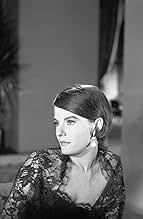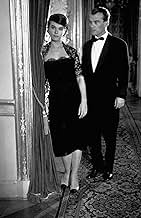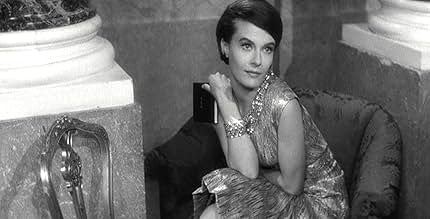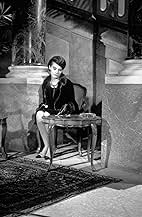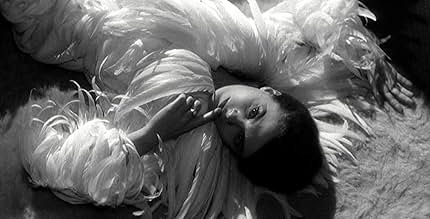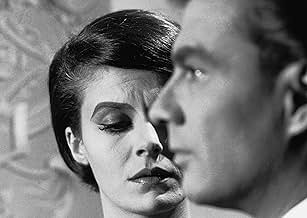CALIFICACIÓN DE IMDb
7.6/10
26 k
TU CALIFICACIÓN
En un extraño y aislado palacete, un hombre conoce a una mujer e intenta convencerla de que se ya se habían conocido antes.En un extraño y aislado palacete, un hombre conoce a una mujer e intenta convencerla de que se ya se habían conocido antes.En un extraño y aislado palacete, un hombre conoce a una mujer e intenta convencerla de que se ya se habían conocido antes.
- Dirección
- Guionista
- Elenco
- Nominado a 1 premio Óscar
- 2 premios ganados y 5 nominaciones en total
Karin Toeche-Mittler
- Un personnage de l'hôtel
- (as Karin Toche-Mittler)
Davide Montemurri
- Un personnage de l'hôtel
- (as Davide Montemuri)
Alan Edwards
- English Introduction
- (sin créditos)
- Dirección
- Guionista
- Todo el elenco y el equipo
- Producción, taquilla y más en IMDbPro
Opiniones destacadas
"Last Year at Marienbad" (1961) Dir.: Alain Resnais
When it comes to cinema, I'm neither a philistine nor a scholar. I'm happy to read into a film's artistic context in preparation for watching it, but it must be self-evident, and not reliant upon anything but its own merit and communicability to be considered a success. In practice, this means I will certainly read the hype, but I won't necessarily believe it. And it's a good job, because "Last Year at Marienbad" remains one of the most hyped, discussed and debated movies of all time. People disagree over virtually everything about it - the pace, the narrative structure, the individual performances, the pretense, even the plot points. Yes, that's right, after forty-eight years people still argue over what actually happens in this film, let alone what it all means and how successfully it is presented to us. So I decided to ignore the minefields of audience opinion (which is largely positive anyway, if wildly diverse) and dive in without fuss, volunteering to watch this movie from the 'philistine' end of the spectrum and if I didn't like it, screw it. It's only one film anyway.
When it became clear what I was watching, and how many traditional storytelling criteria were obviously not going to be fulfilled by "...Marienbad", I felt like I had burst in to the film's aristocratic country retreat wearing torn jeans and waving a bottle of tequila around, but ended up having an awesome time in a completely unexpected way. Make no mistake, I thoroughly enjoyed this movie. It is a near-perfect realisation of a very, very dense and ambitious concept, and Resnais should be proud that he and his film-making team were able to make it. It is stately, baffling, elegant, sinister and brilliant.
Not that I could tell you what it's actually about, of course. Most people seem to think it's about the tricks and subjective nature of the memory, and the inherent flaws in how we cross-reference events with other events over time. These broad, elemental themes are the only ones I feel sure enough about to include in this review, which is illustrative of "Last Year at Marienbad"s disorienting effect. We are taken on an endless stroll through the rooms and corridors of a cold, strange country manor where the upper classes take their holidays and engage in card games and theatre. Their discussions are empty and meaningless, yet they go on forever. Time is not present in a recognisable form as the unnamed narrator loses track of how long he has been there, and how long he has attempted to persuade the unnamed woman that they met before, and that she had promised to run away with him. "Wait for one year," she'd supposedly said. "Next year I will leave with you." But the woman has no memory of him or her promise. She appears to be married to another man, who is tall, dour and imposing. Despite this, she keeps the unnamed narrator at arm's length, drawing him in and then pushing him back as if she does indeed remember something of him but is unwilling to accept it. His struggle to awaken some kind of acknowledgement of their shared past is the premise of the film.
"Last Year at Marienbad" is a bizarre maze of half-recollections and inaccuracies, where words and events are repeated several times in different situations and everything we see is very possibly on an endless loop, eventually folding in on itself and collapsing into a kind of incomprehensible singularity. We have no frames of reference for what we are seeing other than what has already been seen, and we are never to know what's 'now' and what's a memory because the characters cross over between the two. As a result I found myself trying to draw a line between reality and false memory up to about half way through the film, after which I abandoned it as a futile exercise. This is one of its key strengths - it demands so much of the viewer that we are forced to build a structure for it in our own heads, and our efforts are routinely dashed.
This all sounds terribly oblique and ridiculous, and in a sense it is; its detractors have regularly labelled it as such and that's a valid conclusion to reach. But it is spectacular on the eye, and this carried my attention right through the difficulties and to the end of the movie without so much as a pause. The camera sweeps down hallways and bursts out across garden terraces without even a jolt, it literally dances its way through the film as if it were another character. There are odd touches, too, that contribute to the striking atmosphere of the film, like Resnais' decision to have his supporting actors and extras remain completely static until they are speaking or in the company of the main three characters. He also skillfully breaks the pace by accelerating towards several shuddering climaxes in the last half of the film, which renew the viewer's attention and string us further along towards an ending that we hope will allow us something more definite to grasp.
Whether it does or not, I will withhold. It's one of the many reasons to watch this film. But beware, it is genuinely challenging viewing – and in fact, its esotericism is the only reason I won't rate this higher than I have.
When it comes to cinema, I'm neither a philistine nor a scholar. I'm happy to read into a film's artistic context in preparation for watching it, but it must be self-evident, and not reliant upon anything but its own merit and communicability to be considered a success. In practice, this means I will certainly read the hype, but I won't necessarily believe it. And it's a good job, because "Last Year at Marienbad" remains one of the most hyped, discussed and debated movies of all time. People disagree over virtually everything about it - the pace, the narrative structure, the individual performances, the pretense, even the plot points. Yes, that's right, after forty-eight years people still argue over what actually happens in this film, let alone what it all means and how successfully it is presented to us. So I decided to ignore the minefields of audience opinion (which is largely positive anyway, if wildly diverse) and dive in without fuss, volunteering to watch this movie from the 'philistine' end of the spectrum and if I didn't like it, screw it. It's only one film anyway.
When it became clear what I was watching, and how many traditional storytelling criteria were obviously not going to be fulfilled by "...Marienbad", I felt like I had burst in to the film's aristocratic country retreat wearing torn jeans and waving a bottle of tequila around, but ended up having an awesome time in a completely unexpected way. Make no mistake, I thoroughly enjoyed this movie. It is a near-perfect realisation of a very, very dense and ambitious concept, and Resnais should be proud that he and his film-making team were able to make it. It is stately, baffling, elegant, sinister and brilliant.
Not that I could tell you what it's actually about, of course. Most people seem to think it's about the tricks and subjective nature of the memory, and the inherent flaws in how we cross-reference events with other events over time. These broad, elemental themes are the only ones I feel sure enough about to include in this review, which is illustrative of "Last Year at Marienbad"s disorienting effect. We are taken on an endless stroll through the rooms and corridors of a cold, strange country manor where the upper classes take their holidays and engage in card games and theatre. Their discussions are empty and meaningless, yet they go on forever. Time is not present in a recognisable form as the unnamed narrator loses track of how long he has been there, and how long he has attempted to persuade the unnamed woman that they met before, and that she had promised to run away with him. "Wait for one year," she'd supposedly said. "Next year I will leave with you." But the woman has no memory of him or her promise. She appears to be married to another man, who is tall, dour and imposing. Despite this, she keeps the unnamed narrator at arm's length, drawing him in and then pushing him back as if she does indeed remember something of him but is unwilling to accept it. His struggle to awaken some kind of acknowledgement of their shared past is the premise of the film.
"Last Year at Marienbad" is a bizarre maze of half-recollections and inaccuracies, where words and events are repeated several times in different situations and everything we see is very possibly on an endless loop, eventually folding in on itself and collapsing into a kind of incomprehensible singularity. We have no frames of reference for what we are seeing other than what has already been seen, and we are never to know what's 'now' and what's a memory because the characters cross over between the two. As a result I found myself trying to draw a line between reality and false memory up to about half way through the film, after which I abandoned it as a futile exercise. This is one of its key strengths - it demands so much of the viewer that we are forced to build a structure for it in our own heads, and our efforts are routinely dashed.
This all sounds terribly oblique and ridiculous, and in a sense it is; its detractors have regularly labelled it as such and that's a valid conclusion to reach. But it is spectacular on the eye, and this carried my attention right through the difficulties and to the end of the movie without so much as a pause. The camera sweeps down hallways and bursts out across garden terraces without even a jolt, it literally dances its way through the film as if it were another character. There are odd touches, too, that contribute to the striking atmosphere of the film, like Resnais' decision to have his supporting actors and extras remain completely static until they are speaking or in the company of the main three characters. He also skillfully breaks the pace by accelerating towards several shuddering climaxes in the last half of the film, which renew the viewer's attention and string us further along towards an ending that we hope will allow us something more definite to grasp.
Whether it does or not, I will withhold. It's one of the many reasons to watch this film. But beware, it is genuinely challenging viewing – and in fact, its esotericism is the only reason I won't rate this higher than I have.
Scenes at a European spa unfold while a man's mind tries to recollect a love affair of the past season. In one of the most deeply psychological films I have seen, memory itself seems to be the protagonist -- or is it the villain? What plot there is simply provides the material for a meditation on the uncertainty of knowing. The accomplishment of _Last Year at Marienbad_ is to make this point convincingly even in the case of that which one would not expect a man to have difficulty remembering: a sexual involvement and loss. It does so by a hypnotic combination of wheeling, dreamlike images of the resort's architecture and grounds, together with the incantatory, obsessive, recurrent tone of the narrative voice over. In doing this it also transforms a place where people go to be waited on and to play, into a labyrinth haunted by unsmiling shades, where remembering is both impossible and necessary.
This mysterious film shows us a man and a woman in an extravagant and capacious hotel. The man insists that he had an affair with the lady last year in Marienbad (or was it somewhere else?) The woman denies it, and just wants the man to leave her alone. Perhaps the man did meet her, perhaps he didn't. Resnais puts the pieces there and lets us take what we can from it.
The beautiful looking establishment, complete with gardens of splendour, is an eerie setting for the film. The guests seem like they are in a trance most of the time. A card game is shown where a man cannot be beaten, he claims. The cinematography is brilliant. Dark, then white, giving a blinking effect at times; and constantly switching between different locations. The music throughout the film sounds like it's from an old church organ. I can understand why this film will put off some people, because it doesn't explain much, and does meander at a pedestrian pace. But approached in the right mood, and watched in a dark room, this is a film to appreciate. Peter Greenaway thinks so; the film was influential in the making of The Draughtsman's Contract, and is (supposedly) the film Greenaway most admires.
The beautiful looking establishment, complete with gardens of splendour, is an eerie setting for the film. The guests seem like they are in a trance most of the time. A card game is shown where a man cannot be beaten, he claims. The cinematography is brilliant. Dark, then white, giving a blinking effect at times; and constantly switching between different locations. The music throughout the film sounds like it's from an old church organ. I can understand why this film will put off some people, because it doesn't explain much, and does meander at a pedestrian pace. But approached in the right mood, and watched in a dark room, this is a film to appreciate. Peter Greenaway thinks so; the film was influential in the making of The Draughtsman's Contract, and is (supposedly) the film Greenaway most admires.
I am amazed by the plethora of negative comments surrounding this film. Having seen it for the first time recently I thought it one of the most creative representations of a Greek myth to date. It is the story of Orpheus, a hero who attempts to rescue his love from the underworld but must convince her to leave of her own free will. The film is set in a hotel and the surrounding gardens. The film is rich in symbolic imagery and the camera shots beautiful. The score leaves something to be desired but anyone who loves Greek mythology and good cinema should appreciate this film.
10debblyst
It's useless to speculate on the "real" meaning of this dream-like movie that is an investigation on the mechanics of memory, and has the absolutely unique feature of allowing as many interpretations as there have been viewers since it opened to change cinematic grammar, decades ago. I've seen it 4 or 5 times over a span of some 25 years and still find it sumptuously directed, endlessly fascinating, eerie, one of my favorite movies of all time, and above all, an O-R-I-G-I-N-A-L !! Every movie ever made since "Marienbad" has a direct or indirect debt to it, as it abandoned (and subverted) objective story-telling tradition and entered the realm of total subjectivity, challenging movie audiences' intelligence, attention and perception. Of course, it's not meant for viewers who associate movies with light entertainment, though anyone who's ever wondered about his/her own mnemonic idiosyncrasies -- the diffuse, random, inaccurate way we recall facts and sometimes even mix them with imagined stuff -- surely COULD relate to this masterpiece.
There has been many conjectures as to the subject and the plot. Well, if you want a good hint, let me give you a precious one: read the novella "La Jalousie" (Jealousy, 1957), by Alain Robbe-Grillet, who is also the screenwriter of "Marienbad". "La Jalousie" is the thematic and "ideological" inspiration for "Marienbad".
Robbe-Grillet (one of the top names of the French "Nouveau Roman" movement along with Nathalie Sarraute, Marguerite Duras, Michel Butor, etc), was a former agronomist/ mathematician (and his writing shows it) who became a writer/filmmaker with a very personal, geometrical, unemotional, descriptive style. The novella "La Jalousie", like most Nouveau Roman books, is essentially cinematic in their approach of characters and plot, functioning like a film camera, a non-opinionated unobtrusive observer, but insightfully revealing in its "detachment".
His novella "La Jalousie" is a fascinating, maze-like circular construction, in which beginning and end mingle many times over, each time from a different perspective, just like observing a house or a sculpture from different angles one at a time -- which means each angle is only partially accurate, revealing but a portion of the truth, while hiding another. The "observer/narrator" in the book (the husband, but written in the third person - "he") tries to locate in PLACE and TIME the precise moment in which the feeling of jealousy arises in him as he tries to find the extent of his wife's relationship with another man (a.k.a. the threesome in the film). Did an affair really happen? Is it yet going to happen? Or is it his imagination, his suspicion, just his jealous feeling? (btw, this is the same theme as Proust's incomparable masterpiece "La Prisonnière", treated in antipodal, totally psychological, but equally obsessive style).
As in most "Nouveau Roman" novels, the notion of TIME in "La Jalousie" (and also in "Marienbad") is transformed and deformed; the approach of the characters is non-psychological, meaning that thoughts and outbursts of emotion are not dealt with, only the description of places, words, gestures and actions. Everything (even a very strong feeling like the birth of jealousy) is apprehended only through the observation of external facts: small gestures, the position of a chair or a table, a glass found full or empty, an unexpected sound, the way the woman combs her hair or looks at herself in the mirror, a suddenly unusual way of getting up or sitting down which leads to the husband's perception that something has suddenly, dangerously, definitely changed.
Well, it made very much sense to me that language-experimentalist book-worm Alain Resnais (think of all of his movies which were based on literature) and his fascination with memory and the brain (think "Hiroshima Mon Amour", "Je t'Aime Je t'Aime" and "Mon Oncle d'Amérique") should venture in constructing this film in visual terms using the geometrical structure of the novel (hence the breathtaking serpentine camera movements), with no beginning or end, respecting its "external", non-psychological, non-motivational approach of the characters and the plot, never condescending to "explanations".
See the film and read the book! I'm sure that, if you've liked (or been baffled by) the film on a first viewing, you'll have many insights on a second viewing of this absorbing, totally fascinating movie after reading the book on which it is structurally/esthetically based. While it's not essential to do so, it could be kind of a bonus! What else can I say? A definitive, revolutionary, undisputed film classic - 10/10
There has been many conjectures as to the subject and the plot. Well, if you want a good hint, let me give you a precious one: read the novella "La Jalousie" (Jealousy, 1957), by Alain Robbe-Grillet, who is also the screenwriter of "Marienbad". "La Jalousie" is the thematic and "ideological" inspiration for "Marienbad".
Robbe-Grillet (one of the top names of the French "Nouveau Roman" movement along with Nathalie Sarraute, Marguerite Duras, Michel Butor, etc), was a former agronomist/ mathematician (and his writing shows it) who became a writer/filmmaker with a very personal, geometrical, unemotional, descriptive style. The novella "La Jalousie", like most Nouveau Roman books, is essentially cinematic in their approach of characters and plot, functioning like a film camera, a non-opinionated unobtrusive observer, but insightfully revealing in its "detachment".
His novella "La Jalousie" is a fascinating, maze-like circular construction, in which beginning and end mingle many times over, each time from a different perspective, just like observing a house or a sculpture from different angles one at a time -- which means each angle is only partially accurate, revealing but a portion of the truth, while hiding another. The "observer/narrator" in the book (the husband, but written in the third person - "he") tries to locate in PLACE and TIME the precise moment in which the feeling of jealousy arises in him as he tries to find the extent of his wife's relationship with another man (a.k.a. the threesome in the film). Did an affair really happen? Is it yet going to happen? Or is it his imagination, his suspicion, just his jealous feeling? (btw, this is the same theme as Proust's incomparable masterpiece "La Prisonnière", treated in antipodal, totally psychological, but equally obsessive style).
As in most "Nouveau Roman" novels, the notion of TIME in "La Jalousie" (and also in "Marienbad") is transformed and deformed; the approach of the characters is non-psychological, meaning that thoughts and outbursts of emotion are not dealt with, only the description of places, words, gestures and actions. Everything (even a very strong feeling like the birth of jealousy) is apprehended only through the observation of external facts: small gestures, the position of a chair or a table, a glass found full or empty, an unexpected sound, the way the woman combs her hair or looks at herself in the mirror, a suddenly unusual way of getting up or sitting down which leads to the husband's perception that something has suddenly, dangerously, definitely changed.
Well, it made very much sense to me that language-experimentalist book-worm Alain Resnais (think of all of his movies which were based on literature) and his fascination with memory and the brain (think "Hiroshima Mon Amour", "Je t'Aime Je t'Aime" and "Mon Oncle d'Amérique") should venture in constructing this film in visual terms using the geometrical structure of the novel (hence the breathtaking serpentine camera movements), with no beginning or end, respecting its "external", non-psychological, non-motivational approach of the characters and the plot, never condescending to "explanations".
See the film and read the book! I'm sure that, if you've liked (or been baffled by) the film on a first viewing, you'll have many insights on a second viewing of this absorbing, totally fascinating movie after reading the book on which it is structurally/esthetically based. While it's not essential to do so, it could be kind of a bonus! What else can I say? A definitive, revolutionary, undisputed film classic - 10/10
¿Sabías que…?
- TriviaThe match game in the movie is named as "Nim". In order to win the game there is only one tactic including a system called "Nim Sum". If both players use this tactic perfectly, then the owner of the first move will eventually lose. Due to the same reason, it is always disadvantageous to start the game first.
- ErroresExterior night scenes were shot day-for-night, but the sky and reflections of it were allowed in the frame, and they appear as bright white instead of black. This may have been intentional to emphasize the surreality of the film.
- Citas
[X wanders through the hotel's corridors cataloging items he sees]
X: Empty salons. Corridors. Salons. Doors. Doors. Salons. Empty chairs, deep armchairs, thick carpets. Heavy hangings. Stairs, steps. Steps, one after the other. Glass objects, objects still intact, empty glasses. A glass that falls, three, two, one, zero. Glass partition, letters.
- ConexionesFeatured in Fejezetek a film történetéböl: A francia új hullám (1990)
Selecciones populares
Inicia sesión para calificar y agrega a la lista de videos para obtener recomendaciones personalizadas
- How long is Last Year at Marienbad?Con tecnología de Alexa
Detalles
- Fecha de lanzamiento
- Países de origen
- Sitio oficial
- Idioma
- También se conoce como
- Last Year at Marienbad
- Locaciones de filmación
- Productoras
- Ver más créditos de la compañía en IMDbPro
Taquilla
- Total en EE. UU. y Canadá
- USD 207,917
- Fin de semana de estreno en EE. UU. y Canadá
- USD 15,485
- 20 ene 2008
- Total a nivel mundial
- USD 223,111
- Tiempo de ejecución1 hora 34 minutos
- Color
- Mezcla de sonido
- Relación de aspecto
- 2.35 : 1
Contribuir a esta página
Sugiere una edición o agrega el contenido que falta

Principales brechas de datos
What is the Canadian French language plot outline for El año pasado en Marienbad (1961)?
Responda


